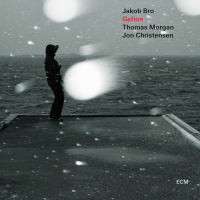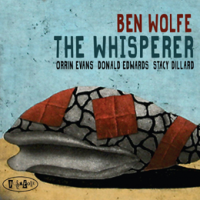Home » Jazz Articles » Extended Analysis » Jakob Bro: Gefion
Jakob Bro: Gefion
And so, perhaps, it's not that unusual that it should take another six years for Bro to make his third appearance on the label, but this time as a leader. Gefion is a definitive sampling of the Danish guitarist's reserved approach to music-making, in this case with a positively empathic trio including one ECM legend in drummer Jon Christensen, who has appeared on well over sixty recordings for the label; and one younger player in bassist Thomas Morgan—who has, since his 2006 label debut on John Abercrombie's Wait Till You See Her, gone on to appear on another five dates with artists ranging from Craig Taborn and Masabumi Kikuchi to Giovanni Guidi, David Virelles...and Stańko.
That Stańko is a common factor amongst these three musicians—Christensen playing with the trumpeter on his career-defining Litania—The Music of Krzysztof Komeda (1997) and, the following year, the equally impressive From The Green Hill, while Morgan was a member of the trumpeter's stellar New York Quartet heard on 2013's Wislawa—is nothing more than a happy coincidence, though the fact that all three spent time with Stańko speaks to the Polish trumpeter's good taste...and the three musicians' inimitable abilities.
Gefion will come as no real surprise to those who've followed Bro's career. His ECM output may, at least for now, be relatively diminutive, but he's been busy releasing albums on his own Loveland Records imprint, including a trilogy of recordings featuring Bill Frisell (a seminal influence) and Lee Konitz, in addition to other projects like 2012's ambitious Bro/Knak, where the guitarist's material—written for a variety of artists including Morgan, Frisell, Virelles, the recently deceased Kenny Wheeler, Paul Bley and others, including a choir, strings and harp—is then transmuted and transmogrified on a companion disc by Danish electronic musician Thomas Knak. Bro has also been touring with Morgan and, at least some of the time, Christensen, so there was plenty of extant chemistry when the trio entered Oslo's Rainbow Studio in November, 2013 to record these eight Bro originals.
While the spirit of Frisell has long loomed over Bro, it's increasingly subsumed in an even sparer approach to both the gorgeous lines Bro weaves and his more subtle use of effects to broaden his expansive soundscapes. Subtle use of looping, delay and reverb, for example, create a finely spun undercurrent on the ten-minute title track that opens Gefion.
Bro begins alone, creating a whisper-quiet cushion based on a repeated three-note motif. Christensen is the next to enter, with his characteristically dark cymbals gradually overtaking Bro as the guitarist fades to dark briefly around the two-minute mark, leaving the drummer alone to add judicious use of his kit. When Bro reenters, it's more definitive yet still atmospheric as he continues to use a volume pedal and delay to shape overlapping layers that set up Morgan's entry as a melodic foil to the guitarist's delivery, around the three-minute mark, of the composition's Americana-tinged melody and simple but effective changes. Built over a rubato foundation, the whole thing, indeed, feels built like a delicate house of cards—firm, even as the trio speaks with a single voice, yet a deceptive whole capable of hanging together only so long as all three are together.
Bro has long been known for tremendous patience and an ability to create a delicate sense of unpredictable inevitability, as he did under less than ideal conditions at the 2012 ELBJazz Festival in Hamburg, Germany. And if Frisell's inescapable Americana roots are part of Bro's heart then so, too, is an inescapable sense of melancholy at the core of "Copenhagen," where the guitarist's gentle fingerpicking provides the context, Christensen's delicate cymbals the canvas, and Morgan's relentless lyricism the focus. Morgan's tone may be more Charlie Haden-informed wood than the gut-punching resonance of Arild Andersen but, with each passing year, he—like Bro—continues to reflect his roots while, at the same time, becoming increasingly unmistakable—and instantly identifiable.
While Christensen has long given up explicit time-keeping, it doesn't prevent Bro's trio from possessing considerable propulsion. Morgan's eighth note-driven lines anchor "And They All Came Marching Out Of" as Christensen's cymbals suggest more than they actually articulate, even when he begins to add toms and the occasional sharp snare hit to the picture. Bro, this time up front in both the mix and the music, builds his improvisation with characteristic care, but what he refuses to show in explicit virtuosity he more than makes up for in invention with his wonderful blend of melodic fragments, elegant cascades and temporally unfettered ideations. His tone is warm, rich and clear; like Frisell, Bro is largely a Fender (or Fender-inspired) man these days; while neither guitarist actually twangs, there's a sense of clarity between the notes that is characteristic of Leo Fender's instruments. No matter how many notes are layered—and with Bro taking considerable advantage of open strings, that can be plenty—everything is lucent for the ear to behold, even as held notes gradually fade into the background before disappearing entirely.
The trio's chemistry infuses the entire forty-minute recording, but can be heard most clearly on the rubato ballad "White" where, at one point, Bro's descending lines are telepathically captured and recapitulated by Morgan, while on the minor-keyed and appropriately titled closer, "Ending," Christensen's cymbal work is particularly in synch with Bro, before both he and Morgan exit, leaving Bro alone to create an ethereal, near-celestial ending that brings Gefion full circle.
Bro may not demonstrate the chops that seem necessary to impress those who measure their music in notes-per-second. But as SONAR's Stephan Thelen remarked in a recent interview for liner notes to the group's upcoming Black Light (Cuneiform, 2015), "I think it's sad that the concept of the 'star' is so important in our culture, but I see a growing number of musicians and groups interested in leaving that concept behind and letting the music be the star." Clearly, with Bro, Morgan and Christensen, the music is, indeed, the star and, with Gefion, one that burns softly but brightly—a harbinger, hopefully, of more to come from this subtle, sublime and painstakingly understated trio.
Track Listing
Gefion; Copenhagen; And They All Came Marching Out of the Woods; White; Lyskaster; Airport Poem; Oktober; Ending.
Personnel
Jakob Bro
guitarJakob Bro: guitar; Thomas Morgan: double bass; Jon Christensen: drums.
Album information
Title: Gefion | Year Released: 2015 | Record Label: ECM Records
Tags
PREVIOUS / NEXT
Jakob Bro Concerts
Support All About Jazz
 All About Jazz has been a pillar of jazz since 1995, championing it as an art form and, more importantly, supporting the musicians who make it. Our enduring commitment has made "AAJ" one of the most culturally important websites of its kind, read by hundreds of thousands of fans, musicians and industry figures every month.
All About Jazz has been a pillar of jazz since 1995, championing it as an art form and, more importantly, supporting the musicians who make it. Our enduring commitment has made "AAJ" one of the most culturally important websites of its kind, read by hundreds of thousands of fans, musicians and industry figures every month.






















